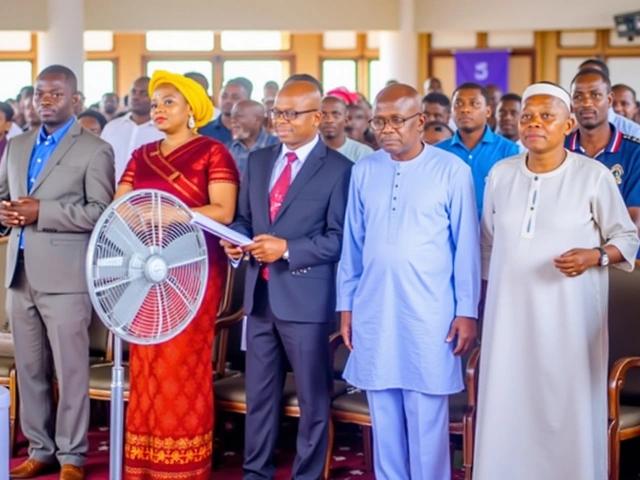In a move that has stirred significant controversy in the Indian political sphere, Prime Minister Narendra Modi's recent endorsement of Janata Dal (S) leader Prajwal Revanna has drawn sharp criticism, particularly from Hyderabad MP Asaduddin Owaisi. Revanna, who is currently entangled in allegations of sexual harassment, seems an unlikely candidate for such high-profile backing, particularly given the serious nature of the accusations against him. This article delves deep into the unfolding political drama, exploring the implications of Modi's endorsement and Owaisi's fervent response.
Background of the Controversy
Prajwal Revanna is not just any political figure but a leader within the Janata Dal (Secular) with a considerable following. The accusations of sexual harassment against him have painted his public image in a questionable light, making Modi's public request for votes in his favor a topic of intense debate. This endorsement came as a surprise to many, given Modi's previous advocacy for women's rights and empowerment in India.
Owaisi's Sharp Critique
Asaduddin Owaisi, known for his forthright and sometimes polarizing remarks, took to the media to express his discontent with the Prime Minister's decision. Owaisi highlighted the stark contradiction in Modi's stance on women's issues. He branded the endorsement of Revanna as not only questionable but also hypocritical, considering Modi's previous public commitments to gender equality and the empowerment of women through initiatives like the 'naari shakti' slogan. Owaisi's criticism extends beyond mere political rivalry; it touches on the broader issues of ethics and accountability in politics.
Broader Political Implications
The controversy arrives at a critical juncture in Indian politics, with general elections on the horizon and growing scrutiny of political leaders' integrity and ethical standings. Modi's support for Revanna has potential ramifications for his party's image and its appeal among female voters, a demographic that has been pivotal in recent electoral cycles. The backlash from women's rights groups and civil society could influence public perception significantly, adding layers of complexity to the electoral strategies of Modi's Bharatiya Janata Party (BJP).
Historical Context and Comparative Analysis
Owaisi's remarks also brought back into focus the Gujarat government's controversial decision to grant remission to convicts involved in the Bilkis Bano case, a decision that had previously sparked widespread outrage and criticism, including from international human rights organizations. By linking these two disparate yet related issues, Owaisi aims to paint a broader picture of the BJP's inconsistent policy approach towards women's rights and justice.
Looking Forward
As the election approaches, the political landscape is rife with maneuvering and strategic alignments. Owaisi's condemnation of Modi's endorsement of Revanna might resonate with a segment of the electorate that is increasingly attentive to issues of gender justice and political accountability. How this will impact the general election results remains to be seen, but one thing is clear: political leaders' standings on sensitive issues such as sexual harassment are more scrutinized than ever in the court of public opinion.
While Modi and the BJP navigate these troubled waters, the opposition parties, including Owaisi's All India Majlis-e-Ittehad-ul-Muslimeen (AIMIM), may find fertile ground to consolidate their positions and appeal to the disaffected sections of society. The unfolding drama will undoubtedly shape the contours of Indian politics in the years to come, making it a critical area of focus for all stakeholders involved.







11 Comments
From a systems‑theoretic perspective, the Modi‑Revanna endorsement can be conceptualized as a perturbation in the political equilibrium, engendering a cascade of feedback loops that reverberate through both macro‑level electoral calculus and micro‑level voter sentiment. The underlying epistemic dissonance originates from a cognitive dissonance framework, wherein the prime minister's prior advocacy for women’s empowerment collides with a tacit endorsement of a figure entangled in sexual harassment allegations, thereby generating a legitimacy deficit. Moreover, the signaling theory suggests that such an endorsement may be interpreted as a heuristic for coalition durability, potentially incentivizing fringe party actors to recalibrate their strategic alignments. However, this signal may also be decoded by the electorate as a breach of normative ethical standards, which in turn could attenuate the perceived integrity of the governing party. Empirically, voter behavior models have shown that credibility erosion can disproportionately affect swing demographics, notably female voters whose turnout has historically been pivotal in marginal constituencies. The intersectionality of gendered policy commitments and patronage networks further amplifies the policy‑politics dichotomy, creating a multidimensional matrix of risk for the BJP. In addition, the cultural capital embedded within Owaisi’s critique functions as a counter‑narrative, mobilizing civil society actors and human rights organizations to amplify discursive resistance. From a game‑theoretic standpoint, the BJP’s utility function now incorporates the probability of voter alienation, which must be balanced against the marginal gains of alliance consolidation. The historical precedent set by the Bilkis Bano remission case serves as a path‑dependency factor, reinforcing perceptions of policy inconsistency. Consequently, the political capital cost of this endorsement may exceed the anticipated strategic benefit, especially if the media agenda-setting dynamics continue to prioritize gender justice narratives. Ultimately, the longitudinal impact on electoral outcomes will be contingent upon the media framing heuristics, the salience of the controversy among key voter blocs, and the ability of opposition parties to capitalize on the perceived ethical incongruence. In sum, the endorsement operates at the nexus of strategic alliance formation and normative accountability, a juxtaposition that is likely to generate sustained analytical discourse across policy, academic, and public spheres.
It is simply indefensible for any leader who claims to champion women's rights to back a person facing serious sexual harassment allegations. Such a move betrays the very principles of moral governance we should expect from our elected officials. The public deserves better accountability.
I hear the frustration many feel about this endorsement, and it’s understandable why people are upset 😊. The tension between political strategy and ethical standards is palpable, and it underscores how vital transparent leadership is for public trust.
Look it’s a classic case of political calculus over principle – a reality we see all the time in power structures. While the tone is harsh, the underlying dynamic is about coalition building not pure ideology. Think about the broader systemic incentives at play.
Considering the extensive media coverage, the public discourse, the potential impact on female voter turnout, and the historical precedents, isn’t it reasonable to ask whether the strategic gain outweighs the ethical cost? Moreover, how might this affect the BJP’s brand integrity, especially among younger demographics?
Political optics matter.
Let’s cut the nonsense – aligning with Revanna is a tactical move to cement regional power blocs and keep the opposition on the back foot. The narrative of moral high ground is a distraction from the real goal: national unity under decisive leadership.
The analysis is shallow and serves as a veneer for an agenda that consistently marginalizes women’s rights. By normalizing such alliances, the pattern of selective accountability continues, reinforcing systemic misogyny within the power hierarchy.
The vibe here feels like a cultural tug‑of‑war, where the narrative spins like a kaleidoscope of power and perception, painting a vivid picture of the stakes at play.
Totally see where you’re coming from – its a tough sitch but we can definitely stay hopeful that more people will speak up and push for change. Lets keep the convo goin and support each other!
Definately we need more voices.
Interesting point! I wonder how this will reshape voter sentiment in the upcoming elections? 😃 It seems like a perfect case study for political behavior analysts.